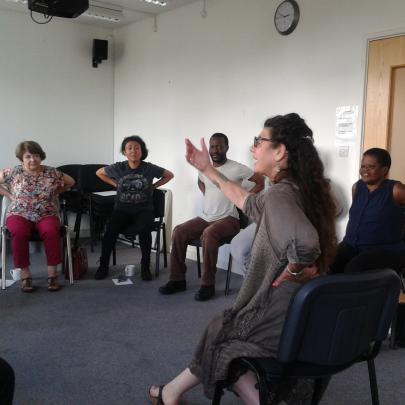My home - a torture survivor's insight into how they rebuilt their life
Tracy, a member of the survivor activism network, Survivors Speak OUT, and member of Write to Life, shares how she used her past experience of torture to help her forge a new career in her new home, the UK.
Which one do I call my home? Many years ago I was rejected by the country where I lived freely, my birth rights were taken, I was stripped to nothing. Which Nationality am I? I am neither.
I came to the UK seeking protection, but to get that protection was not easy; every part of my experience was a lesson or a training. Lessons differ, some are easy, some are tough. My training was tough, like the training of a front line soldier. I had to endure every step till I became who I am today. I am not all that great, but the most important thing is that I am alive, a mother and I can help other people.
I can't change what happened in my past but I can shape today for the future. I was frustrated and humiliated in the past I came from; little did I know that I was being made strong to face challenges in a country I would now call my home. My experience gave me practical lessons, and Write to life at Freedom from Torture has empowered me with therapeutic writing. Whilst I was writing for rehabilitation, I learnt how to write good English and how to express things, to regain what was lost in the past. Most of the time I was writing about my painful experience, but I turned that painful experience to a useful purpose, by writing down what happened to me.
My training was tough, like the training of a front line soldier. I had to endure every step till I become who I am today. I am not all that great, but the most important thing is that I am alive, a mother and I can help other people.
I gained the courage to fight horrible memories, built resilience and determination to go back to university to study and become a useful person, to contribute to the economy of the country which is now my home by being a tax payer. I changed career, from electrical engineer to health and social welfare practitioner. This too was not easy, but to me it came more easily because I had the practical, if painful, experience.
In due course, I was invited to present a paper at a conference on public health. Sitting among professionals, I was able to engage so well that they thought I already had a certificate or diploma in public health. They did know that I was not yet ‘qualified’; I was just an expert by having lived painful experience. I even wrote a public health project proposal about young and middle-aged ethnic minority women having diabetes type 2 and cardiovascular disease. In this project, I mainly focused on asylum seekers and refugees simply because I was drawing from my own experience. I also used a bit of theory from my university module and more theory from the course book written by Professor Michael Mamort.
In my conference presentation, I referred a lot to the book, ‘The Health Gap’ by Professor Michael Mamort. I had no idea until after my presentation that the author was sitting next to me! The Harrington public health team, the dieticians and Professor Mamort were surprised when I told them that I got my knowledge and understanding from my terrible past experiences. I told them that some positive things can come out of horrible things. I also told them I am going to stop at nothing. I am going on to further studies in health and wellbeing so that I can contribute more and help my fellow survivors.
The world is not mine, I cannot have everything. I should be thankful for what I am: a refugee, a survivor and able to walk and live freely without persecution. Forgive me when I whinge about my painful past, help me to focus and look forward, to enjoy my home in a beautiful country, the UK.




